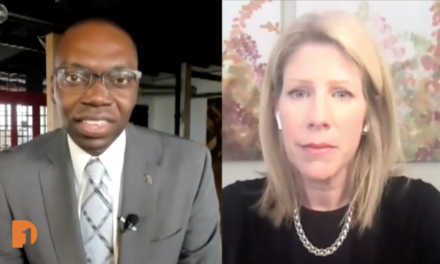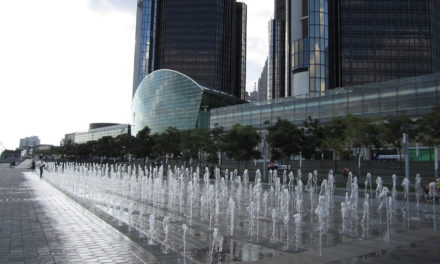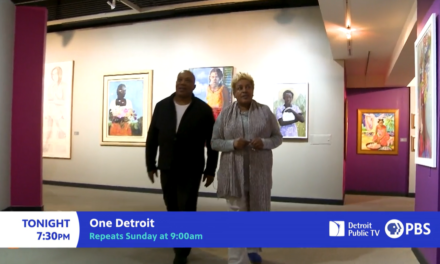It’s not your parent’s newscast anymore. As traditional media outlets like local newspapers and television stations make way for newer forms of news consumption through podcasts, online coverage and citizen reporters who document public meetings, are consumers’ media diets changing with the digital age?
One Detroit takes a closer look at the new ways people are getting their news and how it’s being delivered to them. One Detroit senior producer Bill Kubota examines how journalists and news outlets are adapting to an evolving media diet.
Full Transcript:
Bill Kubota, Producer, One Detroit: A story about the media. Not about how more reporters are getting laid off, but how journalism is adapting. Well, a bit of it, anyway.
Tim Kiska, Journalism Professor, University of Michigan Dearborn: You know, 50 years ago, I mean, the newspapers could live off of, if you were the Free Press or the news, these major full-page Hudson’s ads; Highland Appliance ads.
Bill Kubota: Veteran Reporter and Journalism Professor Tim Kiska, was there when the newspaper business was booming.
Tim Kiska: The Free Press and the news, in my opinion, are doing a really good job with what they’ve got. But they’ve only– their resources are limited.
Bill Kubota: Big city papers, small town ones, downsized or gone in. In Howell, they’ve still got the Livingston Daily, but not the powerhouse of old.
Jon King, Mike & Jon Got It Going On Podcast: When it became really obvious to most people that the newspaper was kind of a shell of what it had been, people would come up and say, “Oh, you must be— you must love that.”
Bill Kubota: Jon King ran the local radio stations’ news department. Less competition must have been good for him, right? Well, maybe a little.
Jon King: I mean, I live in this community and I think communities are better served when you have vibrant, viable news sources that are competing against one another.
Bill Kubota: So here now, add another news outlet to the mix. Mike Marino and Jon King Got It Going On, GIGO for short, where it’s looking up for their daily podcast. This all happened real fast.
Jon King: Well, we’re doing a podcast. Yeah, it actually just finished the podcast and came over here, so that’s why I’m a little bit late.
Bill Kubota: For two decades, King and Marino did morning radio and Howell, where King provided award-winning local news coverage.
Jon King: Today is going to be my last day at WHR, Mike.
Mike Marino, Mike & Jon Got It Going On Podcast: And today is also my last day.
Bill Kubota: January 2022, a dispute with radio management. When the station asked King to leave, Marino went too.
Jon King: The Mike and Jon Brand, for whatever that’s worth, is largely built on community news and information.
Mike Marino: But there is something we want you to know about, and that’s the Miles for Smiles event, which is, it’s the 5th annual event coming up.
Jon King: We have fun. We definitely try and bring an element of humor, try, into what we do. But a lot of it is really based on serving the community with news and information. You know, we’ve added the video component now. All those years we’re on the radio, we could do the hand signals to each other, you sock, stop. And now we can’t, now people can see us.
Mike Marino: It was just, we are who we are. We’re people, we’re two guys doing a radio show. Now we’re just two guys doing a podcast.
Bill Kubota: If The New York Times can have a daily podcast, so can Livingston County, which you can also see on Facebook and YouTube, there’s a website too.
Jon King: Almost immediately, people let us know that they really wanted news as part of what we did. We didn’t originally start with news, but then really quickly, people let us know, like, we want news. We want to know about the community, we want to know what’s going on.
Mike Marino: Jon is a trusted news source in the community, so it made sense to include it.
Jon King: When I started doing news, we were like, well, what do we call this? How do we brand the news? How do we say what the news is? And GIGO just kind of fit. I’m putting up a news, GIGO news logo on there right now.
Mike Marino: It’s fancy, technology is in the palm of his hand.
Jon King: Don’t say it that way, that doesn’t sound right.
Tim Kiska: The technology that a typical podcaster would use, there are more bells and whistles and things that you can do with it, than the Beatles had when they recorded “Abbey Road.”
Jon King: And so, now to be able to do something that I had no experience in, doing video editing, that’s just not– I’m a radio guy.
Tim Kiska: There’s an audience there, now, it’s not a big audience. I think that what we’re getting into is a world of niche stuff.
Jon King: We’ve been able to monetize it and that’s nice. We’ve had some advertisers that have, they see the value in what we’re doing and they’ve come on board, and so, that’s great.
Tim Kiska: The question is, can you get enough advertising to make that go? And that’s always the tough question.
Jon King: It’s not paying our mortgage, mind you. So, we each have other jobs that we’re doing.
Bill Kubota: Part-time pay, but the news infrastructure is still in place.
Jon King: It’s like you have a tipster network out there based on this 20 years of experience and connections that we’ve built up.
Noah Kincade, Coordinator, Detroit Documenters: Sometimes a city council formal session will go on till four in the afternoon.
Bill Kubota: In Detroit, a crew newer to the news game.
Noah Kincade: I’m keeping an eye on how many people have signed up for assignments.
Bill Kubota: It’s the Detroit Documenters, where engaged citizens do the reporting.
Noah Kincade: We train Detroiters to attend government meetings and take notes and report on what happens. We pay them to do this.
Lynelle Herndon, Coordinator, Detroit Documenters: I’m hopeful about the state of the media right now because of what we’re doing. And I think that it’s a growing phenomenon. I think the news needs to be participatory, and that’s exactly what we offer.
Bill Kubota: Documenters, they don’t need a journalism background.
Lynelle Herndon: I just kind of needed a civic side hustle, already interested in civics and community journalism. So, it was a great job for me.
Noah Kincade: I spent the last 25 years as a live sound engineer and I moved to Detroit from San Francisco, you know, during COVID.
Bill Kubota: A COVID lockdown, no shows to do, Noah Kincade turned to documenting.
Noah Kincade: And this is literally people from all different professions who are doing this to help their city.
Bill Kubota: Sonja Stuckey is an educator by trade.
Sonja Stuckey, Detroit Documenter: And I saw where they were paying people to sit in on meetings and take notes and I said, “Wow, okay, I’m going—” so I called.
Kayleigh Lickliter, Detroit Documenter: It popped up on Facebook as an event, an orientation for documentaries. And I was like, oh, that sounds interesting.
Noah Kincade: People want to do this work. People are excited to do this work.
Kayleigh Lickliter: About a month later is when I decided to finally take an assignment. Since then, I’ve been hooked every week.
Bill Kubota: The nonprofit Documenters Project started before the pandemic, part of Outlier Media Detroit, and partnered with several other newsrooms in town. Documenters are in some other mostly Midwest cities, too. The pay’s not high but seems enough to make it worthwhile.
Sonja Stuckey: I’ve done a lot of city council meetings.
Kayleigh Lickliter: We do Wayne County Commission.
Lynelle Herndon: The Land Bank Authority is a big one.
Sonja Stuckey: I’ve been to the Library Commission meeting.
Kayleigh Lickliter: We do GLWA, Great Lakes Water Authority. We do Detroit Water and Sewage Department.
Sonja Stuckey: I did a lot of that when the flood was last year. It feels like I was in all those meetings.
Kayleigh Lickliter: Regional Transit Authority. Occasionally we’ll do DDOT meetings.
Sonja Stuckey: The Board of Police Commissioners meetings, which are very interesting.
Lynelle Herndon: Our documenters really love those assignments.
Kayleigh Lickliter: SEMCOG meetings.
Sonja Stuckey: The Ethics Board meetings.
Kayleigh Lickliter: Anything that pops up, it seems like it will be in the real interests of the people.
Lynelle Herndon: We’re observing everything, the demeanor of the officials, how they interact with each other. The accessibility of the meeting. Now that we’re virtual, like, do they have their name in their zoom screen window? Did they upload the agenda in time? So, we document everything about the meeting. And What you’re going to get out of Documenters notes is not like some synthesized government minutes, but actual notes about the atmosphere and everything.
Noah Kincade: What we publish has been verified multiple times.
Sonja Stuckey: That’s what I like about Detroit Documenters, there is no spin. They fact check everything that we do.
Bill Kubota: Documenters cover meetings in two ways. One writes up meeting details for the record, edited by seasoned journalists, while the other sends a live Twitter stream as meetings happen.
Kayleigh Lickliter: I live tweet these meetings. So as this is happening, I’m tweeting out every detail that I can, taking complex information and simplifying it so that the public can understand what exactly is going on.
Noah Kincade: We want their take on what they saw, but not, you know, their opinions.
Malachi Barrett, Reporter, BridgeDetroit: I’m the only person who covers city government on a day-to-day basis for BridgeDetroit. The documenters really kind of help me fill in the gaps. Having some kind of record, for me as a reporter, to go back and say, oh shoot I missed the Board of Water Commissioners, seemed like there was something interesting going on. I can immediately find out what happened in that meeting.
Bill Kubota: Documenters like Kayleigh Lickliter and Sonja Stuckey, are getting recognized for their work and outlets like Outlier, WDET Radio and the Free Press.
Sonja Stuckey: Actually, the last year has had a lot of big-ticket stuff that people were really voicing their opinion about the
Noah Kincade: Right to counsel, eviction, homelessness right now is a growing issue in Detroit.
Sonja Stuckey: Public comments are what I like to focus on because people come in and they have some very legitimate concerns and a lot of times they will kind of, you know, get the brush off.
Taura Brown, Detroit Resident: I am now facing a retaliatory eviction from my tiny home.
Bill Kubota: Taura Brown, worried her eviction story was forgotten, brought some visual aids to city council that Licklider posted online.
Taura Brown: She caught a picture of it and put it on Documenters and then people started asking me about it again. So, I mean, people knew about it, but they really knew about it after she tweeted about it.
Bill Kubota: Brown said Lickliter’s post led to more news coverage of this tiny house controversy.
Taura Brown: I don’t know if you go on to her Twitter page, she has a massive following, like a lot of people follow her, police, nurses, it’s a potpourri of people following her.
Tim Kiska: It’s going to take a little while for people to say, oh, if I want to find out what’s going on in Detroit, these documenter folks keep on dredging this stuff out, maybe I’ll start paying attention to that. And it takes a while, you know, for that stuff to get traction, it just does.
Bill Kubota: With big stories like the Hudson skyscraper tax break and funding for the Detroit Police, ShotSpotter technology, citizens watch Documenters; watch City Council. Does the City Council watch the Documenters? Maybe they’re a little bit more deliberative because people are watching and people are showing up and talking about it.
Malachi Barrett: Yeah, I get the sense that the City Council is reactive to more eyes on what they’re doing.
Malachi Barrett: It can be pretty obvious with a couple of different votes that happened this year or didn’t happen this year. You know, it came after a lot of residents came forward, well-informed residents, not just people who, you know, heard about something and these people knew what they were talking about.
Taura Brown: I feel like Documenters is kind of like independent journalism that says, Hey, John Q Public, this is what this is, this is who’s doing it, and this is what you should know, and that’s what I like.
Bill Kubota: Turns out Taura Brown works occasionally as a documenter herself. She’s covered the Wayne County Ethics Board. She’s a tenants’ rights activist, too. But she says she won’t let her biases affect her coverage.
Taura Brown: You’ll never find me at a meeting about homeless solutions documenting it. You’ll probably find me there during public comment fussing about it, but you won’t find me there documenting it.
Tim Kiska: You know, we just don’t know where all of this is going to head. I just know that there are some really smart, hardworking people, well-intentioned people, too, trying to make transparency mean something as opposed to a concept.
Noah Kincade: It was built and designed to be everywhere to be in every city.
Lynelle Herndon: We have documentaries, almost every orientation, ask about, do you ever cover Macomb County? And I mean, I–no, get your own documents program. No, I don’t know. I don’t know how it might grow, but right now it’s Detroit Documenters and we’re focused on Detroit.
Malachi Barrett: I would hope that it expands into some of the smaller communities where we’ve really seen this kind of hollowing out of the journalism infrastructure, like the options of where you get your information from.
Bill Kubota: Reporter Malachi Barrett’s thinking of places like Flint, Kalamazoo. But what about places like Livingston County? At least they’ve still got their old watchdogs in place.
Jon King: Things are changing. And so, this is part of kind of settling that in. How do we as a society access information? What is newsworthy? What is trustworthy? Those things have all been kind of thrown up in the air and now it’s beginning to settle down. And I think people are beginning to, in small ways, become a little bit more discerning of who can I trust to give me accurate information? You know, yeah, we joke about being in the basement and, you know, I’m using my phone to videotape this thing. And, you know, we kind of cobbled together the stuff that we need to do this. But I think for the aesthetic of what we do, it works.
Stay Connected:
Subscribe to One Detroit’s YouTube Channel & Don’t miss One Detroit Mondays and Thursdays at 7:30 p.m. on Detroit Public TV, WTVS-Channel 56.
Catch the daily conversations on our website, Facebook, Twitter @DPTVOneDetroit, and Instagram @One.Detroit
View Past Episodes >
Watch One Detroit every Monday and Thursday at 7:30 p.m. ET on Detroit Public TV on Detroit Public TV, WTVS-Channel 56.




